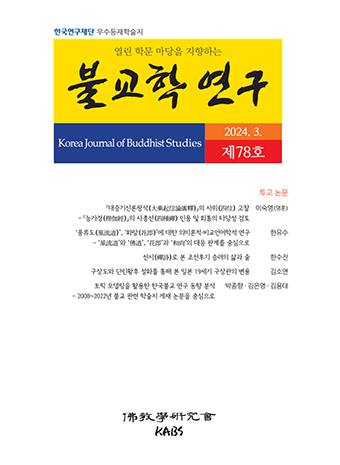Abstract
References
Sorry, not available.
Click the PDF button.
Information
Against our generally accepted idea that Buddhism was declined in Song, Buddhism was developed. But from middle Tang, Chinese society had changed great deal in politics, economy, and culture. Office-literati in North Song endeavored to restore Chinese culture. The revival of Wen (文, culture) is characterized by returning to Chinese original value, but there were two different models of Wen. One is the tendency of literary refinement which had started from Tang. The leader of this group was Yang-yi, a poet of Xi-gun-pa (西崑派). The other was proposed by moralists, especially neoConfucians who regarded the ancient Confucianism as a single value. It is interesting that their different model of Wen were correspondent with their attitude toward Buddhism. The first group thought Buddhism was useful to make Confucian identity and able to enrich Confucian culture, but the second group thought that the establishment of new Confucianism made way against Buddhism. So there were two tasks in Buddhist community in North Song in order to adapt itself to the changed society. One was to overcome the negative opinions against Buddhism and the other was to present new values which would be appropriate to the secularconfucian society. There also were some monks who made their best to restore Wen. They represented the trend that made Buddhism be in harmony with Confucianism. They are 贊寧(Zan-ning), 智圓(Zhiyuan), 契嵩(Xie-song). They tried to prove that Buddhism is not only one of Chinese tradition, but also useful to the reign of emperor. They insisted that Buddhism and Confucianism is identical and have the same educational effect on people. But they failed to persuade Confucian because they emphasized much the similarity between Buddhism and Confucianism and the political efficacy of Buddhism, so that they blurred out its own characteristics. But from the point of view which emphasized the diversity of culture, Buddhism was approved as a kind of Chinese culture. Chan Buddhism appealed to office-literati who were more tolerant, because itdid not claim to be a legitimate factor of Chinese culture but emphasized its special origin and inherits. In fact it contributed to the restoration of Wen not by the way of integration but by the way of extending the contents of Chinese culture. So it had much influence on Chinese literature and arts. The critique on Buddhism in Song for its secularization is not proper.
Click the PDF button.
- Publisher :Korean Association of Buddhist Studies
- Publisher(Ko) :불교학연구회
- Journal Title :Korea Journal of Buddhist Studies
- Journal Title(Ko) :불교학연구
- Volume : 14
- No :0
- Pages :35~59


 Korea Journal of Buddhist Studies
Korea Journal of Buddhist Studies






